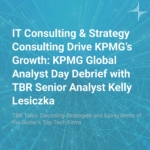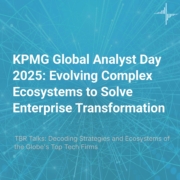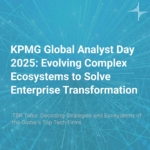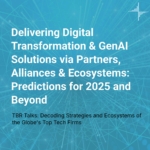IT Consulting & Strategy Consulting Drive KPMG’s Growth: KPMG Global Analyst Day Debrief with TBR Senior Analyst Kelly Lesiczka

Senior Analyst Kelly Lesiczka joins “TBR Talks” host Patrick Heffernan for top takeaways from the KPMG Global Analyst Day 2025 event. In “IT Consulting & Strategy Consulting Drive KPMG’s Growth,” the pair review KPMG’s strategy, including its emphasis on IT and Strategy Consulting, within the context of the firm’s legacy Tax & Audit business model, as well as its position as client zero in implementing and adoption AI across its global operation.
Kelly and Patrick also look at broader trends and analysis she is seeing in TBR’s research on the management consulting space.
Listen and learn with TBR Talks!
Submit your Key Intelligence Questions for Patrick and his guests
Connect with Patrick on LinkedIn
Connect with Kelly on LinkedIn
Learn more about TBR at https://tbri.com/
TBR Talks is produced by Technology Business Research, Inc.
Edited by Haley Demers
Music by Burty Sounds via Pixabay
Art by Amanda Hamilton Sy
IT Consulting & Strategy Consulting Drive KPMG’s Growth: KPMG Global Analyst Day Debrief with TBR Senior Analyst Kelly Lesiczka
TBR Talks Host Patrick Heffernan: Welcome to TBR Talks: Decoding Strategies and Ecosystems of the Globe’s Top Tech Firms, where we talk business model disruption in the broad technology ecosystem, from management consultancies to systems integrators, hyperscalers to independent software vendors, telecom operators to network and infrastructure vendors and chip manufacturers to value added resellers. We’ll be answering some of the key intelligence questions we’ve heard from executives and business unit leaders among the leading professional IT services and telecom vendors.
Kelly Lesiczka, welcome back to the podcast.
Kelly Lesiczka, TBR Senior Analyst: Thank you.
Patrick: Season 3 now. I know it isn’t that kind of amazing.
Kelly: Yeah, it’s a long time.
Initial thoughts on KPMG Global Analyst Day
Patrick: Yeah, we’re cranking through them. So, we did have a chat with our colleagues Boz and Catie and Alex about the big event that we went to at KPMG’s Lakehouse down in Orlando. You were there as well. You also got to experience the incredible 18-hole mini golf course.
Kelly: *laughs*
Patrick: But other than how impressive the mini golf was, what else did you take away from the event? A couple days long. It was a big one. What did you take away from it?
Kelly: I think it was a good two days. It definitely was structured very well. I really appreciate that AI was isolated to one day, or not necessarily isolated, but it had its own dedicated day because it gave them a chance to really talk about other things that are going on in the firm and really walk through that.
I think one of the stronger messages that I heard was definitely around how they’re trying to be customer zero and really before they’re pushing around AI and bringing a lot of those technologies and new services to their clients, they’re making sure that they know, they can- they understand them. They’re people can move forward with them. I think that was definitely a strong message that was further echoed through the KPMG Velocity platform. That was the internal one. I think that was just a stronger message that they had that further resonated the value for us that that was their new strategy and something that they’re following.
Patrick: I think too, one thing that struck me about that is that when they talked about customer zero, the emphasis was not on just the technology, which is I think what we hear a lot, like we applied this technology to ourselves. It was also on the change management part, like we went through this change management ourselves.
Kelly: Right.
Themes from client stories
Patrick: They also had some good client stories. I don’t know, without saying any of the client names, were there any that sort of, really resonated with you?
Kelly: Yeah, I think, there were a few. I think they all kind of followed their own journey, but I think they all came back to the same idea, around KPMG really understanding the whole problem and not just pushing with the certain solution, but they helped them to evolve along a certain trajectory, kind of. So, they helped them create plans and move along. And I think in a few of them we got to see hints of the Ignition Center, which was also really cool.
Patrick: Right.
Kelly: And to see how they’re impacting their clients’ own employees and how they approach situations, how they’re able to solve problems. So, I think that was really cool because you can think like, oh, you just come into a session, you can brainstorm yourself, but it’s different when you’re pulled out of your own environment and put with all these different things that are designed to inspire you or to help promote thinking and around areas you didn’t even think of before.
KPMG’s global presence
Patrick: Speaking of people from every region. I know it’d be hard to name a country that wasn’t represented at the KPMG event. Except for France. I don’t think there was anyone from France. It’s the one country that- and I shouldn’t say that because maybe somebody was. But do you think that said something about the firm as a whole?
Kelly: Yeah, I definitely think so. I think I interacted with a lot of people from Australia, just coincidentally, and a lot of people from the U.K., but they all move around a lot, too. And it sounds like a lot of them have relocated too. So, it definitely says a lot about the firm, about how they really do operate more globally than perhaps some of their other peers, for sure, as they’re able to bring those people together and also put them in all these different spots.
Patrick: Right.
Kelly: Not just where they originated.
Management consulting longitudinal trends
Patrick: And then if we sort of expand from KPMG itself to the larger management consulting space. So, you’ve been running the management consulting benchmark for a while now. You’ve been looking at PwC and EY and McKinsey and BCG for years. So, I’m curious what you think is sort of- what have been some of the bigger longitudinal changes in management consulting over the last few years and I know one thing that that in thinking about the discussion we were going to have, I know we used to say that technology permeates all of consulting, and that was something sort of, kind of new, five, six, seven, eight, 10 years ago. With GenAI, it’s sort of like that just, you know, that just sort of went right through the roof. You don’t even need to say it anymore, but are there are other sort of longitudinal trends that you think have changed the way you think about management consulting from where you were ten years ago to where you are now.
Kelly: Yeah, I think strategy consulting is an example. We’ve seen a lot of changes there as it kind of tapered off a bit, but I think with using technology, we’ll definitely see a stronger push, I think, around on how you actually use this. Now that we’re moving past just the operational phase of how do we create more efficiency, it’s now how do we actually use this to change our business model? Something that was echoed that we heard a lot over the past few years is how not just clients, but like, our vendors’ clients, they understand that they have to change their business model in order to be successful or they’re just not going to be relevant. And that was something we heard on and on again. And so, I think strategy is a big piece of that. So, how do you change your strategy to align with either technology or either tax benefits. Like how do you make the most of your geographic strategy. So, I think there are a lot of different pieces that we’ll probably see come together, how you actually look at the entire organization and not just one piece of it, for sure.
And then, managed services, I think definitely we’ve seen push a lot more. The names have kind of changed a little bit from what they originated to, but I think a lot of the consultancies are seeing the value within managed services and the benefit for them that they need to really push more in this area and really grow it because there is demand for it. It’s just finding the right balance, whether it be around tax. And then even with the audit side too, what you can do in terms of audit with managed services.
Patrick: Right, right and then back to KPMG for a minute, the audit example that they showed
Kelly: Yeah.
Patrick: It was quite impressive. And true too, that managed services now has become a way to find new consulting opportunities or sort of it’s no longer the old play of you, you know, you do the strategy consulting and then the operations consulting to lead to an implementation to then do a managed services. Now it’ll come right back around with new opportunities. And I think it’s PwC that talks about business model reinvention. And they’ve actually been talking about it for like a year and a half now. And I think, to me I heard a lot of echoes of that at the KPMG event.
Kelly: Yeah.
Patrick: I think KPMG talked about transaction to transformation.
Kelly: Yes. Yeah
Patrick: Which for them interestingly is the transaction is not like the KPMG and the client. It’s the client making an acquisition or a merger or divestiture or whatever. That’s the transaction, which then KPMG helps with that. And then they help with the transformation of the business as well.
Kelly: Yeah.
Patrick: And that kind of advising, that kind of consulting never goes away, right?
Kelly: No. And I think it’s, we saw a bit of a surge year or so ago, and now it’s definitely coming back to how we’re seeing, because people are trying to figure out what they need to do with their business, what makes the most sense in terms of offloading some of those areas that just aren’t relevant for them anymore. And then they’re able to focus on areas that they want to pursue anywhere around technology or, just higher value services. So, I think that’s definitely a good area for them to be in.
Management consulting in the next year
Patrick: So, what’s coming for the next year or so in management consulting, what do you anticipate going into the next- the benchmarks for this year? Because we’ll have one coming up in a couple of months, and then we’ll have one in December as well.
Kelly: I don’t think we’ll see as great of investments as we have in the past in terms of the technology investments like EY was really forthcoming with a lot of those larger tech investments. I don’t think we’ll see quite that scale of investment anymore. I think it’s more focusing on that internal side. Like at the beginning of the pandemic, a lot of the focus was on people and then it was- now it’s more back to business as usual, but I think we’ll see a lot more emphasis on the people. Even just looking at some of the IT services vendors, over this past quarter, the focus on training and really even within the firm and then also outside of the firm, either for somebody or with universities, I think seeing a lot more focus on the people is definitely something we’ll see. Because you need to be able to use these AI tools, to some extent in how rapidly it’s changing the viability of the platforms in terms of adoption. I know for GenAI, we’ve heard from mostly the India-centric vendors that the cost to adopt them is a lot lower now, so I think having those skills is definitely something that they’re going to have to kind of push towards, for sure.
Patrick: Right.
Threats to the traditional management consultancies
Do you think we’ll see- well so we’ve talked about this for years like the idea that the traditional management consultancies, so McKinsey, Bain, BCG, the Big Four firms, Accenture for a while, IBM for a while, Capgemini, you know, in bits and pieces. So those companies have traditionally done management consulting. And we’ve always talked about the threat from the India-centrics or you know the DXCs or the NTTs of the world. Do you think, is that threat ever going to materialize into something real? Are we going to see like a, even a Fujitsu, which is has launched Uvance and has like a consulting practice, do you think we’ll see a challenge to the management consultancies from those firms or no?
Kelly: I think the challenge comes more from other consultancies. Just in terms of looking at the composition of revenue from strategy versus Big Four versus the solutions. So the solutions that IT services, I think, might be worth watching, but I feel like a lot of the other vendors, the IT services ones that are building consulting, it’s more focused. I don’t think it’s quite comparable to the scale or capabilities of the main consultants that we watch. Just thinking about like EY and PwC and that tax, it’s something that those IT services vendors could never really look to compete with.
Patrick: Right.
Kelly: I think they’d have to do something quite large in scale and more aggressive, which would shift their whole strategy. And I’m not sure how well it would go over with their clients anyways.
It’s always something, I think, to keep in mind and watch your peers and what they’re investing in. But I don’t really think the consulting is that directly aligned. It’s, I think it’s more strategic to partner with them as opposed to think of them as a competitor. It’s more of what can we do that’ll be good. I know, I think it was PwC and DXC a long, long time ago, but thinking of- and I know that didn’t really pan out to too much, but I think that kind of structure actually does make sense in theory on what DXC would bring and what PwC would bring, like bring that consulting with those capabilities.
Patrick: Right. So, supposedly EY and Infosys have that kind of relationship now.
Kelly: Yeah.
Dream partnership pairing
Patrick: So, knowing the companies that you know and your coverage of management consulting, your coverage of IT services companies, what would be your like ideal pairing? Like not EY and Infosys, that already exists. But pick another you know, pick one of the Big Four or one of the management consultancies.
Kelly: Yeah.
Patrick: Is it McKinsey and HCLTech?
Kelly: *laughs*
Patrick: Is it? Yeah. I know you laugh when I say that, but I mean, what would be an ideal pairing?
Kelly: I do think HCL was at least one, I mean maybe with PwC or even KPMG, I think. I think the engineering that they bring, and a lot of their other technical expertise is definitely stronger than some of its peers.
Patrick: Right.
Kelly: And that’s something that a lot of the consultancies we’re seeing now are really trying to ramp up. Like PwC for example, I think they had a few engineering acquisitions. So, I think that pairing with that to see what, because HCL’s had it for years and years and they’ve constantly been building it out with more acquisitions. A lot of it’s manufacturing kind of, but just thinking about it in general, the engineering and how they’ve built it out for so many years, showing that heritage and I think working with it definitely can show you what you can actually do with it.
Patrick: Right.
Kelly: And it can help with products or something.
Patrick: And there’s no threat of HCLTech trying to build a consulting practice in any way of a threat to a PwC. Like a PwC/TCS wouldn’t work because TCS has way too much scale and size and could potentially sort of use the opportunity, use the inroads to do their own consulting work. But HCLTech, I can imagine that. Yeah. Yeah. So, all right, so in Season 4 we’ll have another chat and we’ll see whether or not that prediction came true.
Final thoughts
One last question. Back to KPMG. Back to the analyst event at Lakehouse. The same question I asked Boz and Catie and Alex, what was the best part of the event?
Kelly: That’s a good question. I feel like the one-on-ones were really helpful, and I hate to say social hour, because it’s hard to value an event on social hour, but I think the conversations had with a lot of the KPMG people, as you pointed out, they came from all over the place, from all over the world. And so, I think having those conversations with them to get their perspectives on everything within the firm and plus all those external factors that are impacting the firm, was actually really helpful. And then it feeds back into the event and it brings into a new light when you have the value, and then seeing them up on stage too was always nice because they were like, oh, this is what we’re going to talk about. And then listening to them, actually go through that and it’s like, no, like that actually does make sense. And they definitely echoed that overall message and they always came back to it, which was very valuable.
Patrick: Well, that first night was very casual. There was no set dinner. And we ended up chatting with so many KPMG people.
Kelly: Oh yeah, yeah. Right.
Patrick: It was just a much more casual setting. And so, I would say that really set the tone for the whole event, where all the KPMG people were just so open and constantly, I mean, talkative, you know?
Kelly: Yeah.
Patrick: And not in a bad way at all. In a very good way.
Kelly: No, they’re very happy to share, like what they do. And they were very passionate about what they’re doing. You could definitely tell with who they brought.
Patrick: Didn’t you get a hole in one on at least one of the —
Kelly: I did. Yeah.
Patrick: Yeah. There you go. So that was not the highlight?
Kelly: No *laughs*
Patrick: I thought it would be.
Kelly: Yeah. *laughs*
Patrick: Excellent. All right, Kelly, thank you so much. We’ll talk again very soon.
Kelly: Sounds good.
Patrick: Next week I’ll be speaking with TBR Principal Analyst Boz Hristov and Senior Analyst Kelly Lesiczka, about the potential labor pyramid collapse. Don’t forget to send us your key intelligence questions on business strategy, ecosystems, and management consulting through the form in the show notes below. Visit tbri.com to learn how we help tech companies large and small answer these questions with the research, data and analysis my guests bring to this conversation every week.
Once again, I’m your host Patrick Heffernan, Principal Analyst at TBR. Thanks for joining us and see you next week.
TBR Talks: Decoding Strategies and Ecosystems of the Globe’s Top Tech Firms
Join TBR Principal Analyst Patrick Heffernan weekly for conversations on disruptions in the broader technology ecosystem and answers to key intelligence questions TBR analysts hear from executives and business unit leaders among top IT professional services firms, IT vendors, and telecom vendors and operators.
“TBR Talks” is available on all major podcast platforms. Subscribe today!

 Technology Business Research, Inc.
Technology Business Research, Inc. Technology Business Research, Inc.
Technology Business Research, Inc. Technology Business Research, Inc.
Technology Business Research, Inc.